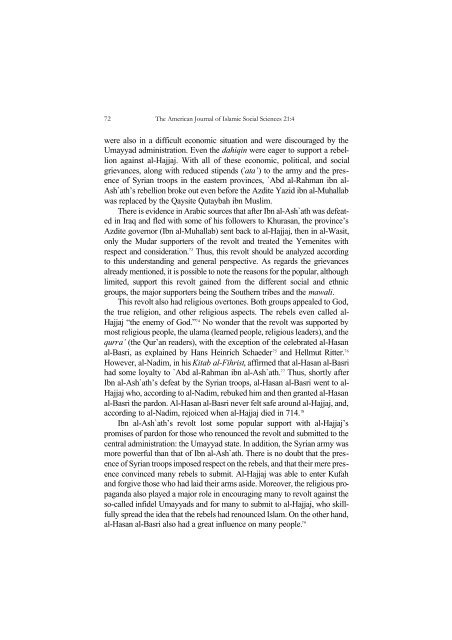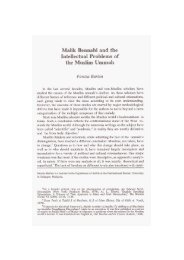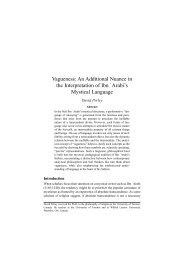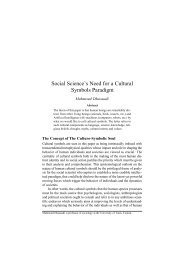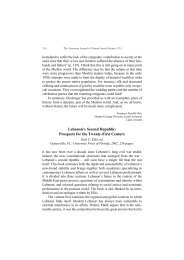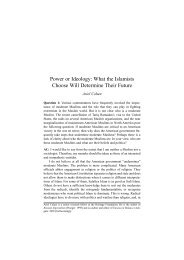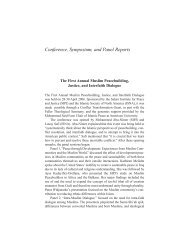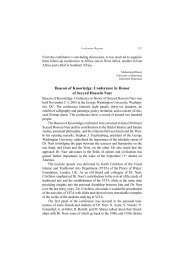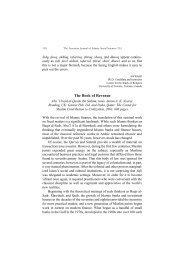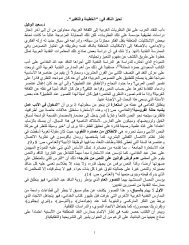Arab Tribes, the Umayyad Dynasty, and the `Abbasid ... - Epistemology
Arab Tribes, the Umayyad Dynasty, and the `Abbasid ... - Epistemology
Arab Tribes, the Umayyad Dynasty, and the `Abbasid ... - Epistemology
You also want an ePaper? Increase the reach of your titles
YUMPU automatically turns print PDFs into web optimized ePapers that Google loves.
72 The American Journal of Islamic Social Sciences 21:4<br />
were also in a difficult economic situation <strong>and</strong> were discouraged by <strong>the</strong><br />
<strong>Umayyad</strong> administration. Even <strong>the</strong> dahiqin were eager to support a rebellion<br />
against al-Hajjaj. With all of <strong>the</strong>se economic, political, <strong>and</strong> social<br />
grievances, along with reduced stipends (`ata’) to <strong>the</strong> army <strong>and</strong> <strong>the</strong> presence<br />
of Syrian troops in <strong>the</strong> eastern provinces, `Abd al-Rahman ibn al-<br />
Ash`ath’s rebellion broke out even before <strong>the</strong> Azdite Yazid ibn al-Muhallab<br />
was replaced by <strong>the</strong> Qaysite Qutaybah ibn Muslim.<br />
There is evidence in <strong>Arab</strong>ic sources that after Ibn al-Ash`ath was defeated<br />
in Iraq <strong>and</strong> fled with some of his followers to Khurasan, <strong>the</strong> province’s<br />
Azdite governor (Ibn al-Muhallab) sent back to al-Hajjaj, <strong>the</strong>n in al-Wasit,<br />
only <strong>the</strong> Mudar supporters of <strong>the</strong> revolt <strong>and</strong> treated <strong>the</strong> Yemenites with<br />
respect <strong>and</strong> consideration. 73 Thus, this revolt should be analyzed according<br />
to this underst<strong>and</strong>ing <strong>and</strong> general perspective. As regards <strong>the</strong> grievances<br />
already mentioned, it is possible to note <strong>the</strong> reasons for <strong>the</strong> popular, although<br />
limited, support this revolt gained from <strong>the</strong> different social <strong>and</strong> ethnic<br />
groups, <strong>the</strong> major supporters being <strong>the</strong> Sou<strong>the</strong>rn tribes <strong>and</strong> <strong>the</strong> mawali.<br />
This revolt also had religious overtones. Both groups appealed to God,<br />
<strong>the</strong> true religion, <strong>and</strong> o<strong>the</strong>r religious aspects. The rebels even called al-<br />
Hajjaj “<strong>the</strong> enemy of God.” 74 No wonder that <strong>the</strong> revolt was supported by<br />
most religious people, <strong>the</strong> ulama (learned people, religious leaders), <strong>and</strong> <strong>the</strong><br />
qurra’ (<strong>the</strong> Qur’an readers), with <strong>the</strong> exception of <strong>the</strong> celebrated al-Hasan<br />
al-Basri, as explained by Hans Heinrich Schaeder 75 <strong>and</strong> Hellmut Ritter. 76<br />
However, al-Nadim, in his Kitab al-Fihrist, affirmed that al-Hasan al-Basri<br />
had some loyalty to `Abd al-Rahman ibn al-Ash`ath. 77 Thus, shortly after<br />
Ibn al-Ash`ath’s defeat by <strong>the</strong> Syrian troops, al-Hasan al-Basri went to al-<br />
Hajjaj who, according to al-Nadim, rebuked him <strong>and</strong> <strong>the</strong>n granted al-Hasan<br />
al-Basri <strong>the</strong> pardon. Al-Hasan al-Basri never felt safe around al-Hajjaj, <strong>and</strong>,<br />
according to al-Nadim, rejoiced when al-Hajjaj died in 714. 78<br />
Ibn al-Ash`ath’s revolt lost some popular support with al-Hajjaj’s<br />
promises of pardon for those who renounced <strong>the</strong> revolt <strong>and</strong> submitted to <strong>the</strong><br />
central administration: <strong>the</strong> <strong>Umayyad</strong> state. In addition, <strong>the</strong> Syrian army was<br />
more powerful than that of Ibn al-Ash`ath. There is no doubt that <strong>the</strong> presence<br />
of Syrian troops imposed respect on <strong>the</strong> rebels, <strong>and</strong> that <strong>the</strong>ir mere presence<br />
convinced many rebels to submit. Al-Hajjaj was able to enter Kufah<br />
<strong>and</strong> forgive those who had laid <strong>the</strong>ir arms aside. Moreover, <strong>the</strong> religious propag<strong>and</strong>a<br />
also played a major role in encouraging many to revolt against <strong>the</strong><br />
so-called infidel <strong>Umayyad</strong>s <strong>and</strong> for many to submit to al-Hajjaj, who skillfully<br />
spread <strong>the</strong> idea that <strong>the</strong> rebels had renounced Islam. On <strong>the</strong> o<strong>the</strong>r h<strong>and</strong>,<br />
al-Hasan al-Basri also had a great influence on many people. 79


